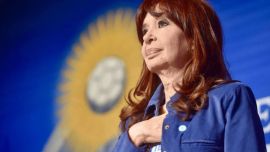Rail and air links to Peru's famed Machu Picchu site were cut early Friday after a flare-up in weeks-long protests that have killed dozens.
The airport in Cusco, gateway to Peru's tourism crown jewel, was closed as protests kicked off in the city, leading to clashes with police.
Supporters of ousted president Pedro Castillo have marched and barricaded streets across the South American country since December, demanding new elections and the removal of current leader Dina Boluarte.
The demonstrations have at times turned violent and at least 42 people have been killed in clashes with security forces, including a police officer burned alive in a vehicle, while hundreds more have been injured.
"My uncle is dead. He had two bullets in his body," said Sonia Quispe, niece of Marcos Quispe, who was among an initial count of 17 killed during a violent attempt to take over the airport in the city of Juliaca on Monday.
"His death has been so tragic. They killed him in the clashes at the airport. Who shot him? The police."
The 17 were laid to rest Thursday in Juliaca, a city in the southern Puno region close to the Bolivian border.
A 16-year-old protester, hospitalised since Monday, died Thursday in the city, bringing the total number of civilians killed there to 18.
In Cusco, the main airport was closed suddenly Thursday "as a preventative measure," Peru's transportation ministry announced on Twitter, adding that the closure would be "indefinite.,"
It is the second time the airport has shut down since the unrest began.
Train connections between Cusco and Machu Picchu were also suspended until further notice, the railway company said in a statement citing safety concerns.
Major flashpoints have occurred near Peru's airports, which are guarded by security forces after protesters stormed runways during an initial wave of uprisings in early December.
Clashes broke out Wednesday night in Cusco, the former capital of the Incan empire, with protesters attempting to enter the airport, while some torched a bus station, attacked shops and blocked train tracks with large rocks.
Peru's rights ombudsman said one person died and more than 50 people, including 19 police officers, were injured in the turmoil, while police said they had arrested 11 people.
Leonela, a university student protesting in Cusco on Thursday, said: "We ask Dina Boluarte to be conscientious as a mother, as a daughter, as a Peruvian.
"She should resign from her position... the advancement of the general elections should be now."
March against 'dictatorship'
Also on Thursday, trade unions, left-wing parties and social collectives marched through Lima, the capital that has largely been spared violence so far, to denounce a "racist and classist... dictatorship."
"There is a lot of indignation, pain, suffering," said fashion designer Doris Zevallos, who was at the protest. "This is causing psychological damage to the entire population, who are aware of what is happening inside the country, especially with our provincial brothers and sisters who are being killed as they are, a total massacre."
In addition to demanding Boluarte's resignation, protesters want Congress to be dissolved and a new body set up to rewrite the constitution – which was adopted in 1993 under the mandate of Alberto Fujimori.
The former president is serving a 25-year prison sentence for crimes against humanity committed during his time in power.
The mass demonstrations broke out in early December after Castillo was ousted from office for attempting to dissolve Congress and rule by decree, seeking to prevent an impeachment vote against him.
Roadblocks remain in 10 of Peru's 25 departments, the transport superintendency said.
Boluarte, 60, was Castillo's vice-president but took over once he was ousted on December 7. She is the sixth person to hold the presidency in five years.
Castillo, who was being investigated in several fraud cases during his tenure, has been remanded in custody for 18 months, charged with rebellion.
–– AFP



















Comments